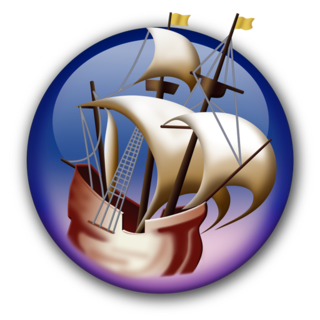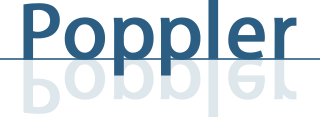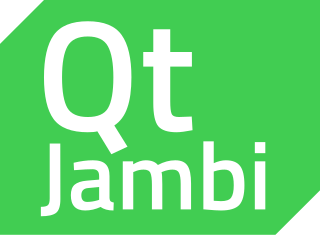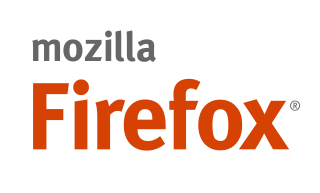
Calligra Suite is a graphic art and office suite by KDE. It is available for desktop PCs, tablet computers, and smartphones. It contains applications for word processing, spreadsheets, presentation, databases, vector graphics, and digital painting.

StarOffice is a discontinued proprietary office suite. Its source code continues today in derived open-source office suites Collabora Online and LibreOffice. StarOffice supported the OpenOffice.org XML file format, as well as the OpenDocument standard, and could generate PDF and Flash formats. It included templates, a macro recorder, and a software development kit (SDK).

The software release life cycle is the process of developing, testing, and distributing a software product. It typically consists of several stages, such as pre-alpha, alpha, beta, and release candidate, before the final version, or "gold", is released to the public.

Calligra Stage is a free presentation program that is part of the Calligra Suite, an integrated office suite developed by KDE.

PyQt is a Python binding of the cross-platform GUI toolkit Qt, implemented as a Python plug-in. PyQt is free software developed by the British firm Riverbank Computing. It is available under similar terms to Qt versions older than 4.5; this means a variety of licenses including GNU General Public License (GPL) and commercial license, but not the GNU Lesser General Public License (LGPL). PyQt supports Microsoft Windows as well as various kinds of UNIX, including Linux and MacOS.

NeoOffice was an office suite for the macOS operating system developed by Planamesa Inc. It was a commercial fork of the free and open source LibreOffice office suite, including a word processor, spreadsheet, presentation program, and graphics program. It added some features not present in the macOS versions of LibreOffice and Apache OpenOffice. The last few versions were based on LibreOffice 4.4, which was released mid-2014.

Amarok is a free and open-source music player for Linux, macOS, Windows, and other Unix-like operating systems. Amarok is part of the KDE project, but it is released independently of the central KDE Software Compilation release cycle. Amarok is released under the terms of the GPL-2.0-or-later.

jMonkeyEngine is an open-source and cross-platform game engine for developing 3D games written in Java. It can be used to write games for Windows, Linux, macOS, Raspberry Pi, Android, and iOS. It uses Lightweight Java Game Library as its default renderer, and also supports another renderer based on Java OpenGL.

Poppler is a free software utility library for rendering Portable Document Format (PDF) documents. Its development is supported by freedesktop.org. It is commonly used on Linux systems, and is used by the PDF viewers of the open source GNOME and KDE desktop environments.

QtJambi is a Java binding of the cross-platform application framework Qt. It enables Java developers to use Qt within the Java programming language. In addition, the QtJambi generator can be used to create Java bindings for other Qt libraries and future versions of Qt. Unlike GTK, there are no Swing LAF implementations that use Qt for rendering.

Mozilla Firefox 3.0 is a version of the Firefox web browser released on June 17, 2008, by the Mozilla Corporation.

Zotero is free and open-source reference management software to manage bibliographic data and related research materials, such as PDF and ePUB files. Features include web browser integration, online syncing, generation of in-text citations, footnotes, and bibliographies, integrated PDF, ePUB and HTML readers with annotation capabilities, and a note editor, as well as integration with the word processors Microsoft Word, LibreOffice Writer, and Google Docs. It was originally created at the Center for History and New Media at George Mason University and, as of 2021, is developed by the non-profit Corporation for Digital Scholarship.

Oracle VM VirtualBox is a hosted hypervisor for x86 virtualization developed by Oracle Corporation. VirtualBox was originally created by InnoTek Systemberatung GmbH, which was acquired by Sun Microsystems in 2008, which was in turn acquired by Oracle in 2010.

IBM Lotus Symphony is a discontinued suite of applications for creating, editing, and sharing text, spreadsheet, presentations, and other documents and browsing the World Wide Web. It was first distributed as commercial proprietary software, then as freeware, before IBM contributed the suite to the Apache Software Foundation in 2014 for inclusion in the free and open-source Apache OpenOffice software suite.
Constrained Energy Lapped Transform (CELT) is an open, royalty-free lossy audio compression format and a free software codec with especially low algorithmic delay for use in low-latency audio communication. The algorithms are openly documented and may be used free of software patent restrictions. Development of the format was maintained by the Xiph.Org Foundation and later coordinated by the Opus working group of the Internet Engineering Task Force (IETF).

Arora is a discontinued free and open-source web browser developed by Benjamin C. Meyer. It was available for Linux, Mac OS X, Windows, FreeBSD, OS/2, Haiku, Genode, and any other operating system supported by the Qt toolkit. The browser's features included tabbed browsing, bookmarks, browsing history, smart location bar, OpenSearch, session management, privacy mode, a download manager, WebInspector, and AdBlock.

Otter Browser is a cross-platform web browser that aims to recreate aspects of Opera 12.x using the Qt framework. Otter Browser is free and open-source software and is licensed under GPL-3.0-or-later. It works on Linux-based operating systems, FreeBSD, OpenBSD, macOS, Haiku, RISC OS, OS/2, and Windows platforms.

Lumina Desktop Environment, or simply Lumina, is a plugin-based desktop environment for Unix and Unix-like operating systems. It was designed specifically as a system interface for TrueOS and systems derived from Berkeley Software Distribution (BSD) in general, but it has been ported to various Linux distributions.
The project that became Firefox today began as an experimental branch of the Mozilla Suite called m/b. Firefox retains the cross-platform nature of the original Mozilla browser, using the XUL user interface markup language. The use of XUL makes it possible to extend the browser's capabilities through the use of extensions and themes. The development and installation processes of these add-ons raised security concerns, and with the release of Firefox 0.9, the Mozilla Foundation opened a Mozilla Update website containing "approved" themes and extensions. The use of XUL sets Firefox apart from other browsers, including other projects based on Mozilla's Gecko layout engine and most other browsers, which use interfaces native to their respective platforms. Many of these projects started before Firefox, and probably served as inspiration.















